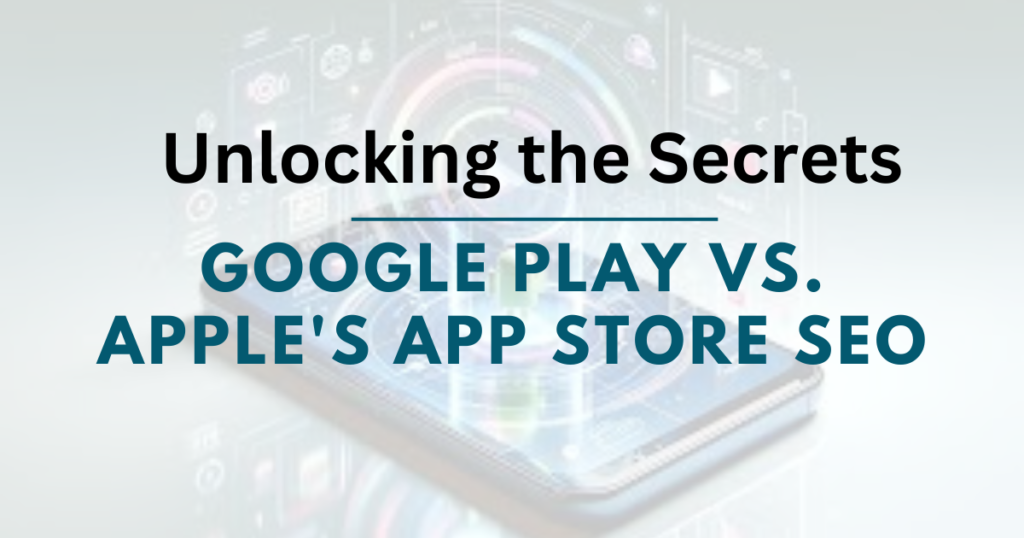Mobile applications have become an integral part of our daily lives. With millions of apps available for download, developers face fierce competition to make their apps stand out. One of the crucial strategies in ensuring app visibility is through Search Engine Optimization (SEO). However, when it comes to optimizing apps for Google Play vs. Apple’s App Store SEO, there are significant differences that developers need to understand.
Why SEO Matters for Mobile Apps
Before delving into the disparities between Google Play and Apple’s App Store SEO, it’s essential to grasp why SEO is vital for mobile applications. SEO enhances app discoverability, increases organic traffic, and improves app rankings within the app stores’ search results. A well-optimized app is more likely to be found by users, leading to higher downloads and better user engagement.
Google Play SEO: Navigating the Algorithm
Google Play, as part of the Google ecosystem, operates on an algorithm that prioritizes several factors in determining app ranking. Primarily, keyword optimization reigns supreme. Crafting concise, relevant, and high-traffic keywords is the cornerstone of Google Play SEO. Additionally, factors like app description, user engagement, and app performance metrics play pivotal roles in Google Play’s algorithm.
Apple’s App Store SEO: Cracking the Code
Contrary to Google Play, Apple’s App Store employs a slightly different approach to SEO. While keywords hold significance, Apple emphasizes the importance of app title and subtitle for keyword inclusion. App reviews, ratings, and downloads also heavily influence App Store rankings. Moreover, Apple’s stringent review process ensures that only high-quality apps make it to the store, contributing to user trust and app visibility.
Role of Backlinks in Google Play vs. App Store
When it comes to backlinks, Google Play and Apple’s App Store have contrasting perspectives. Google Play, akin to traditional web SEO, considers backlinks as a factor for app ranking. Quality backlinks from reputable sources can enhance app visibility and credibility on the platform. Conversely, Apple’s App Store does not prioritize backlinks in its algorithm. Instead, Apple focuses on internal factors like app performance and user engagement to determine app rankings.
Read more – Essential checklist for any app store optimization strategy
Key Differences: A Comparative Analysis
- Keyword Optimization: Google Play prioritizes keyword density, whereas Apple’s App Store focuses on strategic keyword placement in titles and subtitles.
- Review and Rating Impact: Both platforms consider user reviews and ratings, but Apple’s review process is more stringent, affecting app visibility.
- Algorithm Complexity: Google Play’s algorithm is more dynamic and multifaceted, while Apple’s App Store algorithm emphasizes specific factors like app title and user engagement.
Navigating the SEO Landscape: Best Practices
- Keyword Research: Conduct thorough keyword research to identify high-traffic and relevant keywords for both platforms.
- Optimized Titles and Subtitles: Craft compelling app titles and subtitles for Apple’s App Store to strategically incorporate keywords.
- User Engagement: Foster user engagement through regular updates, responsive customer support, and interactive features to enhance app performance metrics.
- Quality Assurance: Prioritize app quality to meet Apple’s rigorous review standards and uphold user trust.
Conclusion
In the competitive realm of app optimization, understanding the nuances between Google Play and Apple’s App Store SEO is paramount. By leveraging platform-specific strategies and adhering to best practices, app developers can maximize visibility, attract users, and propel their apps to success in both ecosystems.
FAQs
1. Is SEO equally important for both Google Play and Apple’s App Store?
Yes, SEO is crucial for both app stores as it enhances app discoverability and increases organic traffic, leading to higher downloads.
2. How can developers optimize their apps for Google Play and Apple’s App Store?
Developers can optimize their apps by incorporating relevant keywords, optimizing metadata, soliciting positive reviews, and creating compelling visual assets.
3. Are there any differences in the approval process between Google Play and Apple’s App Store?
Yes, Google Play offers more flexibility in terms of app submissions and updates, while Apple’s App Store has a more stringent approval process.
4. Which factors influence app rankings in Google Play and Apple’s App Store?
Factors such as app quality, user engagement, download velocity, user ratings, and reviews influence app rankings in both app stores.
5. How often should developers update their app store listings for optimal SEO performance?
Developers should regularly update their app store listings with relevant keywords, new features, and improvements to maintain optimal SEO performance and visibility.





It’s a pity you don’t have a donate button! I’d without a doubt donate to this brilliant blog!
I suppose for now i’ll settle for book-marking and adding your RSS feed to my Google
account. I look forward to new updates and will talk about this website with my Facebook group.
Chat soon!
Useful information. Fortunate me I discovered your web site unintentionally, and I am shocked why this accident did
not took place in advance! I bookmarked it.
What’s up, everything is going fine here and ofcourse every one is sharing facts,
that’s truly fine, keep up writing.
Hello, yup this article is really nice and I have learned lot of things
from it about blogging. thanks.
Hi there would you mind sharing which blog platform you’re using?
I’m planning to start my own blog in the near future but I’m having a difficult time making a decision between BlogEngine/Wordpress/B2evolution and Drupal.
The reason I ask is because your design seems different then most blogs and I’m looking for something unique.
P.S My apologies for getting off-topic but I had
to ask!
I want to to thank you for this excellent read!! I certainly
enjoyed every little bit of it. I have you bookmarked to look
at new stuff you post…